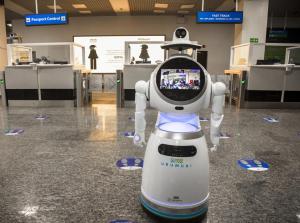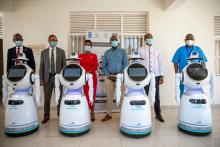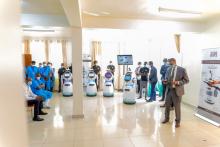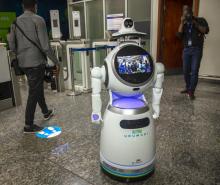Robots use in Rwanda to fight against COVID-19
One of the challenges being faced worldwide is the rate of infection of health professionals while treating COVID-19 patients. 2016 statistics show the following picture of Rwanda’s health sector: 1/50,505 ground ambulance / population Ratio; 1/10,055 Doctor/population ratio; 1/1,094 Nurse/population ratio; 1/10,500 Laboratory technicians /population ratio.
Although Rwanda is on track to meeting most of the required quota, the country cannot afford the set back that a pandemic like COVID-19 among health professionals would cause.
To minimize contact time with confirmed cases and therefore reducing the risk of contamination of health professionals in COVID-19 treatment centres, robots were deployed. At Gatenga and Kanyinya treatment centres in Kigali City, visits by medical staff to patients went from 3-4 to 2 per day since May 2020. The 5 human-size robots are programmed to perform temperature screening, take readings of vitals, deliver video messages and detect people not wearing masks then instruct them to wear masks properly.
On Tuesday, May 19 at the Kanyinya COVID-19 Treatment Centre, the 5 robots were launched by the Ministry of Health. Named in Kinyarwanda, Akazuba, Ikirezi, Mwiza, Ngabo, and Urumuri are made by Zora Bots, a Belgian company specialised in robotics. They were acquired through a partnership between the UNDP Rwanda Accelerator Lab (AccLab) and the Ministry of ICT and Innovation. Each robot costs about $30,000.
Urumuri is currently deployed at the Kigali International Airport with the capacity to screen 50 to 150 people per minute and report abnormalities to officers on duty.
As Rwanda is reopening Kigali International Airport for commercial international flights from 1st of August, Urumuri will allow to speed up mass screenings of fever for passengers as they land.
Smart anti-epidemic robots have been used in Asia to help flatten the COVID-19 curve. The pandemic has proven to be a crosscutting challenge affecting Rwanda in all sectors (Health, Economy, Education, Agriculture, …). It therefore requires different sometimes innovative solutions with available resources like robots.







